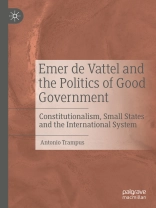This book explores the history of the international order in the eighteenth and nineteenth century through a new study of Emer de Vattel’s
Droit des gens (1758). Drawing on unpublished sources from European archives and libraries, the book offers an in-depth account of the reception of Vattel’s chief work. Vattel’s focus on the myth of good government became a strong argument for republicanism, the survival of small states, drafting constitutions and reform projects and fighting everyday battles for freedom in different geographical, linguistic and social contexts. The book complicates the picture of Vattel’s enduring success and usefulness, showing too how the work was published and translated to criticize and denounce the dangerousness of these ideas. In doing so, it opens up new avenues of research beyond histories of international law, political and economic thought.
Jadual kandungan
1 Introduction: The Invention of Good Government for the Law of Nations.- 2 Vattel’s Droit des gens. A Transnational Bestseller from the Age of Enlightenment.- 3 The Good Government: The Constituting and Constituted Nation.- 4 The First Reception: Sicily, Corsica and the Mediterranean Islands.- 5 The Great Crisis of the Sixties and the Political Reforms Between Piedmont and Tuscany.- 6 The Lost Manuscript and the First Italian Translation of Vattel’s Droit des gens.- 7 The Consequences of the American Revolution: From Naples to Venice.- 8 Ships and Diamonds: Vattel Between Linguet and Casanova.- 9 From Natural Rights to the Rights of Man.- 10 Bern, the French Revolution and the Congress of Vienna.- 11 State and Nation: The Political Neutralisation of the Droit des gens in Nineteenth-Century Europe.- 12 Conclusion: Vattel’s Droit des gens Between Good Government and Modern Democracy.
Mengenai Pengarang
Antonio Trampus is Professor of Modern History at Ca’ Foscari University Venice, Italy. His research focuses on cultural history and constitutionalism. His books include the critical edition of Benjamin Constant’s commentary on Filangieri (2012) and the edited volume, with K. Stapelbroek, of The Legacy of Vattel’s Droit des gens (2019).












